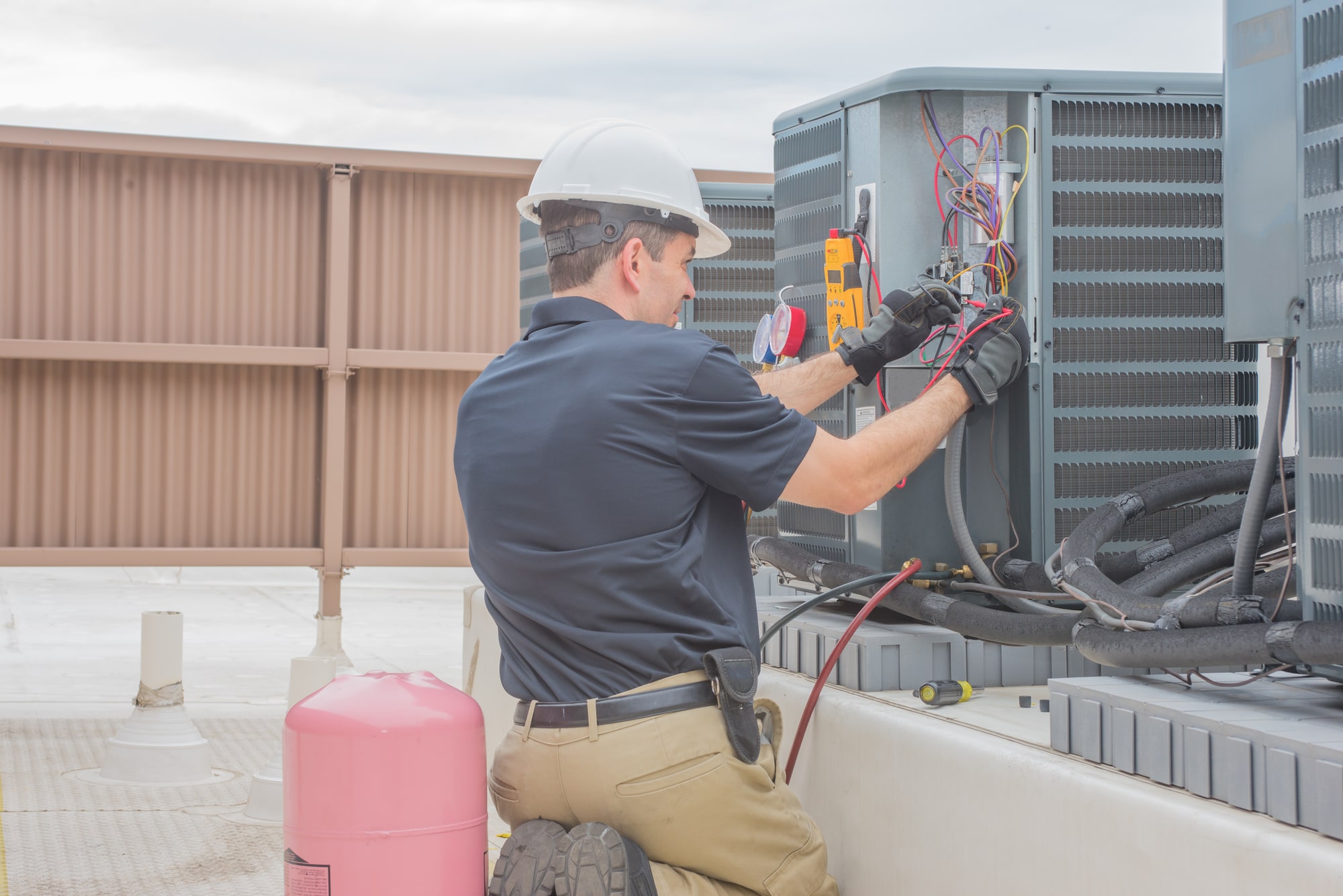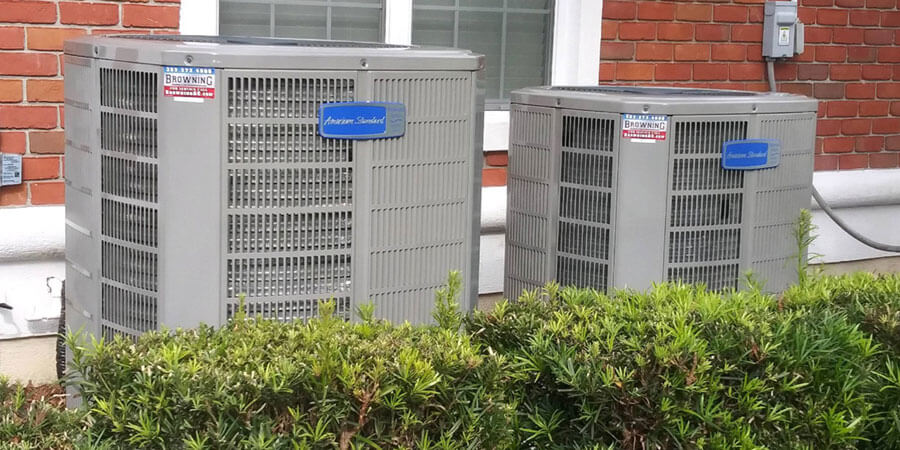Professional Tips for Successful Air Conditioning Installation Brownwood TX
Professional Tips for Successful Air Conditioning Installation Brownwood TX
Blog Article
Comprehending HVAC: A Comprehensive Guide to Heating, Ventilation, and Air Conditioning Provider
In today's swiftly advancing globe, an essential understanding of heating and cooling systems is no more a high-end but a necessity for making certain optimal interior atmospheres. This overview provides a detailed exploration of home heating, air, and ventilation conditioning solutions, demystifying the intricate interplay of parts that regulate comfort and performance. As we navigate via the intricacies of picking the ideal system and preserving it for peak efficiency, one begins to realize the extensive effect these systems have on energy consumption and sustainability. What usual risks could be undermining your heating and cooling system's possibility without your understanding?
Fundamentals of Cooling And Heating Equipments
Heating, Ventilation, and A/c (A/C) systems are pivotal components in modern architecture, consistently guaranteeing ideal interior air top quality and thermal convenience. These systems are important to keeping the wellness, performance, and wellness of passengers in residential, industrial, and commercial setups. At their core, HVAC systems are developed to manage the temperature level, moisture, and tidiness of air, creating a comfortable environment despite exterior climate problems.
The basic components of a heating and cooling system include home heating systems, air flow air ducts, and a/c systems. The home heating element generally includes either a furnace or a warmth pump, which warms up air to be distributed throughout the building. Air flow, a crucial element of the system, includes the exchange of exterior and indoor air, controlling and reducing indoor toxins wetness levels. This process can be normally or mechanically assisted in, typically utilizing fans and ductwork to distribute air effectively.

Choosing the Right Heating And Cooling System
Choosing a cooling and heating system entails a careful equilibrium of efficiency, expense, and viability to the particular requirements of a building. The choice process begins with an assessment of the structure's size, layout, and planned use. Bigger frameworks may need more durable systems, while household structures might benefit from smaller, much more energy-efficient designs. It is necessary to think about the environment of the place, as this will affect the kind of system that best preserves comfy indoor temperature levels throughout the year.
Power performance scores, such as SEER (Seasonal Power Performance Ratio) for a/c unit and AFUE (Annual Fuel Usage Performance) for heating systems, are important variables when reviewing possible systems. Higher scores typically indicate far better performance and lower operating costs with time. In addition, potential buyers must contrast in advance costs with prospective lasting financial savings to determine the best monetary choice.
One more essential consideration is the type of system-- whether a central system, split system, or ductless mini-split is proper. Each deals distinctive benefits and constraints, dependent on installment intricacy and room needs. Appointment with HVAC professionals is recommended to guarantee that the system selected aligns with both the building's requirements and the occupants' comfort choices.
Relevance of Routine Upkeep
As soon as the ideal HVAC system is picked and mounted, preserving its efficiency and longevity comes to be a concern. Regular upkeep is crucial for making certain that the system runs at peak efficiency, decreasing the danger of unexpected break downs. Regular evaluations and servicing can identify possible issues prior to review they intensify into expensive repair work or substitutes, consequently extending the life expectancy of the equipment.

Additionally, adhering to a maintenance timetable can preserve the service warranty protection, as numerous suppliers need proof of normal servicing to recognize guarantee claims. Involving expert HVAC technicians for regular maintenance guarantees that all parts are examined accurately and readjusted as needed. This aggressive method not just safeguards the investment in the cooling and heating system however additionally promotes a much healthier interior environment for passengers, enhancing general well-being.
Enhancing Power Efficiency
To boost energy efficiency in heating and cooling systems, it is essential to implement strategies that lessen power consumption while keeping optimum performance. One efficient strategy is the integration of wise thermostats, which permit precise control over temperature settings based on tenancy and time of day. These tools can learn patterns and adjust home heating and cooling timetables accordingly, decreasing unnecessary energy usage.
An additional approach involves regular evaluation and cleansing of cooling and heating components, such as air filters, coils, and ductwork. Clean systems operate much more effectively, as dirt and particles can block air movement and compel the system to function harder, consuming more energy. Guaranteeing appropriate insulation and securing is additionally vital, as it avoids energy loss and lowers the load on heating and cooling systems.
Moreover, upgrading to energy-efficient devices, such as variable-speed motors and high-efficiency compressors, can significantly reduce power intake. These parts change their rate and result to match the particular heating or cooling down need, stopping energy waste.
Spending in power recuperation air flow systems can likewise boost efficiency by exchanging warmth in between outgoing and inbound jet stream, lowering the demand for extra heating or cooling. By taking on these procedures, cooling and heating systems can attain remarkable energy efficiency, leading to lowered functional costs and ecological effect.
Troubleshooting Common Issues
When dealing with HVAC system breakdowns, a structured approach to repairing can successfully identify and resolve usual problems. The initial step includes examining the thermostat setups to ensure they are proper and functioning. Often, wrong settings or dead batteries can create the system to behave unpredictably. Next, take a look at the air filters. Clogged or filthy filters limit airflow, lowering system efficiency and might lead to overheating or cold.
Inspect the circuit breakers and merges; stumbled breakers or blown fuses can halt system procedures. In addition, examine the outside system for any kind of obstructions or particles that can hinder performance. Regular maintenance of these components can avoid lots of common troubles.
Listen for unusual noises, which may indicate mechanical issues such as worn-out belts or motor issues. Inexplicable rises in power costs can additionally signify underlying ineffectiveness or leakages in ductwork. Make sure that all vents are unhampered and open to informative post facilitate optimal airflow.

Specialist intervention becomes necessary if these steps do not settle the concern, especially for complicated issues like refrigerant leakages home ac installation or electrical mistakes. Normal assessments and upkeep by licensed technicians can preemptively resolve prospective issues, making sure the a/c system runs successfully and reliably.

Verdict
To conclude, a complete understanding of a/c systems is critical for making sure optimal interior comfort and air top quality. By choosing the proper system based upon specific building needs, the effectiveness and sustainability of ventilation, air, and home heating conditioning services can be maximized. Normal upkeep is necessary for maintaining system performance and durability, while power efficiency can be significantly enhanced with educated practices. Addressing usual problems via efficient repairing further guarantees the trusted procedure of cooling and heating systems, benefiting both house owners and companies.
As we navigate via the intricacies of selecting the right system and maintaining it for peak performance, one starts to realize the extensive influence these systems have on power usage and sustainability.Heating, Ventilation, and Air Conditioning (HVAC) systems are crucial elements in modern design, continually making certain optimal interior air high quality and thermal convenience (Brownwood TX HVAC Contractor).Another essential factor to consider is the type of system-- whether a centralized system, split system, or ductless mini-split is proper. Clean systems run more efficiently, as dust and particles can obstruct air movement and force the system to function harder, taking in even more power.In final thought, a thorough understanding of HVAC systems is critical for ensuring optimal interior convenience and air quality
Report this page